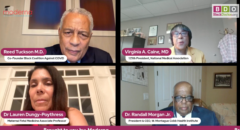
Could the end of the pandemic be on the horizon? New data suggests that the high-transmission rate of the Omicron variant of COVID-19, which is ripping its way through the U.S. population leaving antibodies in its wake, could possibly result in herd immunity.
"Sometimes a rapid-fire could burn through very quickly,” says world-renowned virologist Dr. David Ho in a recent CNBC report, “but then put itself out.”
Is herd immunity on the horizon?
Although Dr. Ho's theory is a speculative one, it is agreed upon by other experts. According to Dr. Bruce Farber, Northwell Health’s chief of infectious diseases, the “best-case scenario” of the coronavirus would be a highly contagious variant that doesn’t make most people particularly sick and creates a temporary baseline of immunity.
“It could certainly help end large spikes of deadly COVID with high hospitalizations,” he adds.
Dr. Anthony Fauci of the National Institute of Allergy and Infectious Diseases shared his belief that the country’s focus should pivot away from case count numbers to the severity of cases. “As you get further on and the infections become less severe,” he says, “it is much more relevant to focus on the hospitalizations as opposed to the total number of cases.”
Fortunately, although the Omicron variant is highly contagious, it has so far caused less hospitalization and death —particularly among those that are vaccinated.
According to new data, 62% of the U.S. population have received some form of a vaccine, but only 30% have received a booster shot, which improves protection.
As many as 73% of COVID cases in the country have been tied to Omicron. Just before Christmas, Dr. Fauci made an appearance on Good Morning America to discuss the rapid spread of Omicron. It is “truly unprecedented in the rapidity at which it spreads,” Dr. Fauci said at the time.
RELATED: J & J’s Booster Brings Robust Protection Against Omicron, Study Shows
Will COVID ever disappear?
The idea of the pandemic ending may sound promising. We all want the world to return to normal life. However, scientists warn that it is highly unlikely that COVID will ever disappear completely.
“This virus is so well adapted for human-to-human transmission that it’s never going to go away,” Dr. Timothy Brewer says. “There will be periods when there will be more cases and [fewer] cases, just like it occurs with influenza every year.”
The good news, however, is that disease authorities maintain their theory that the coronavirus will weaken, and regular vaccination and continued anti-viral treatments, combined with immunity, will likely lessen its severity in the years that follow.
How is herd immunity achieved?
Infection and vaccines are the main paths to achieving herd immunity.
Natural infection
When enough people in the population have recovered from COVID and have developed protective antibodies against future infection, herd immunity can be achieved.
However, according to the Mayo Clinic, problems will arise if we solely rely on infection as a method to reach herd immunity:
- Reinfection. It’s not clear how long you are protected from getting sick again after recovering from COVID-19. Even if you have antibodies, you could get COVID again.
- Health impact. Experts estimate that in the U.S., 70% of the population — more than 200 million people — would have to recover from COVID to halt the pandemic. This number of infections could lead to serious complications and millions of deaths, especially among older people and those who have existing health conditions. The health care system could quickly become overwhelmed.
RELATED: What Do I Do IF…COVID Decision Guide
Vaccines
Unlike the natural infection method, vaccines create immunity without causing illness or resulting in complications. Vaccines have successfully been able to control contagious diseases such as smallpox, polio, diphtheria, rubella and many others.
With herd immunity, even those who can't be vaccinated, such as newborns or those who have compromised immune systems can be protected.
Still, the Mayo Clinic notes problems that may arise with trying to reach herd immunity through vaccination:
- Vaccine hesitancy. Some people may object to getting a COVID vaccine because of religious objections, fears about the possible risks or skepticism about the benefits. If the proportion of vaccinated people in a community is below the herd immunity threshold, a contagious disease could continue to spread.
- Protection questions. It’s not clear how long the vaccines will protect you from COVID. Further research is needed to see how much the vaccines reduce the transmission of the virus. Also, research suggests that COVID-19 vaccines may have lower efficacy against some of the variants of the virus. New variants, which could be more resistant to vaccines, are regularly emerging.
- Uneven vaccine roll-out. The distribution of COVID vaccines has greatly varied among and within countries. If one community achieves a high vaccination rate and surrounding areas don’t, outbreaks can occur if the populations mix.
Regardless of the challenges, the best way to protect yourself and your loved ones from COVID is through social distancing, vaccinations/boosters and regular COVID testing, especially if you have been in contact with someone that tested positive for the virus.









